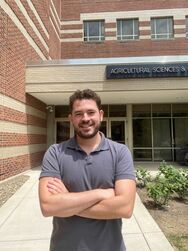Announcement of the awardees for the EWRS travel grants for bi-lateral cooperation 2024
The EWRS Travel grants for bi-lateral cooperation were established in 2024 for the first time to create an opportunity for students and early career scientists to visit the lab of another EWRS member for a short-term visit.
The call for applications was opened in May 2024, and seven applications were received. The bi-lateral cooperation reviewing committee included Husrev Mennan, Lena Ulber, Aleksandra Savic and Maor Matzrafi. In addition, the applications were evaluated by the EWRS SciCom based on the contribution of the proposed research to the discipline of weed science and the EWRS objectives, the academic record of the applicant, and the applicant’s potential contributions to the future of weed science.
After reviewing all applications, three students were selected, which will now be awarded with the travel grants.
We are herewith happy to present the three awardees for the EWRS travel grants for bi-lateral cooperation 2024:
1. 
Home institution: University of Lleida (Spain), School of Agrifood, Forestry Enginering and Veterinary Medicine (ETSEAFiV), Department of Agricultural and Forest Sciences and Engineering, Weed and Plant Ecology Research Group
Host institution: University of Vigo (Spain), Faculty of Biology, Department of Plant Biology and Soil Science
Title of the project: Circular Economy Strategies for IWM in Vineyards
Organic vineyards face significant challenges in managing weeds sustainably. Traditional methods like repeated in-row tillage are effective but cause issues such as soil erosion and damage to vine infrastructure. To address these challenges, this project explores alternative strategies using organic mulches derived from local agricultural by-products. This bilateral research initiative is led by Dr. Bàrbara Baraibar at University of Lleida and researchers from the University of Vigo - Dr. Nuria Pedrol, Dr. María Pardos-Mura, and Dr. Carolina G. Puig.
The primary goal is to evaluate the phytotoxic potential of aqueous extracts from four different plant-based materials used as mulch in organic vineyards (almond hulls, almond skin, vine pruning and walnut hull). Specifically, the study focuses on their impact on weed germination and early growth of two problematic species: Conyza bonariensis and Bassia scoparia.
The findings are expected to contribute significantly to sustainable vineyard practices, enhancing soil health and vineyard sustainability. Results will be compiled for publication in a cooperative research paper aimed at Weed Research.

Home institution: Wageningen University & Research, Centre for Crop Systems Analysis, Wageningen (Netherlands)
Host institution: Cornell University, College of Agriculture and Life Sciences, School of Integrative Plant Science, Soil and Crop Sciences Section, Cornell (USA)
Title of the project: The effect of weed functional traits on cereal-legume intercrop performance and weed suppression
In intercropping systems with varying species competitiveness, weed suppression typically aligns with the more competitive species, thereby reducing weed pressure on the less competitive species. To investigate the mechanisms driving weed suppression at the crop stand level, crop models can complement field experiments. Functional-structural plant (FSP) modelling is an advanced modelling technique that can dynamically simulate plant structures in interaction with the environment to simulate 3D plant growth in space and time. Such a model can accurately capture detailed processes in how plants react to other plants and their environment. In previous studies, we focused on identifying cropping system design choices that impact both weed suppression and crop yield, as well as specific canopy and crop plant traits, such as ground cover, light interception, tiller and branch number, tiller angle, and plant height. Additionally, we developed an FSP model to analyze cereal and legume species, aiming to quantify the impact of plant traits on crop performance and weed suppression in cereal-legume intercropping systems. However, we treated weeds as a homogenous category, not distinguishing between species or examining their functional traits. In this project, we aim to determine whether weed functional traits are linked to the weed suppressiveness of cropping systems in cereal and legume sole and intercrop setups. We also seek to assess how weed composition differs between sole crops and intercrops and to identify and quantify weed traits that influence crop performance and weed suppression. Ultimately, we aim to identify cropping system designs that allow for a high weed diversity with a low impact of weeds on crop biomass and yield. With this bilateral cooperation made possible through the EWRS grant, we want to combine modelling expertise with weed functional trait expertise to enhance our understanding of weeds and weed suppression in various cropping systems with both field and simulated data.

Home institution: University of Haifa, The Department of Evolutionary and Environmental Biology, Haifa (Israel) & Department of Plant Pathology and Weed Research, Agricultural Research Organization - Volcani Institute, Newe-Ya’ar Research Center, (Israel)
Host institution: Julius Kühn-Institut (JKI)- Federal Research Centre for Cultivated Plants, Institute for Plant Protection in Field Crops and Grassland, Braunschweig (Germany)
Title of the project: The effect of climate change on the efficacy of ACCase inhibitors - Lolium rigidum Gaud. and Alopecurus myosuroides Huds. as a case study
Herbicide effectiveness is highly dependent on environmental conditions (e.g. temperature, radiation level, humidity and more) and changes in these factors may affect herbicide efficacy. For instance, post-application high temperatures may decrease herbicide efficacy, particularly for herbicides with metabolism-based mechanisms of resistance. Reviewing meteorological data from Israel and Germany shows that extreme temperature events (e.g. heat waves) are becoming more common in recent decades. These events are likely to occur in autumn and spring when most herbicidal treatments are applied, suggesting a potential impact on herbicide efficacy. Thus, the aim of this project is to investigate reduced plant sensitivity to herbicides under changing climatic conditions. In addition, an analysis of the phenological and competitive traits of different L. rigidum and A. myosuroides populations from Israel and Germany grown together under shared environmental conditions will reveal differences in the responses of the resistant and sensitive populations to climate conditions. The findings are expected to contribute significantly to This would serve as a key for the development of effective weed management programs for future climates and is of great importance for global agriculture. This bilateral research initiative is led by Dr. Maor Matzrafi from the Agricultural Research Organization – Volcani Institute, Newe Ya'ar Research Center and Dr. Lena Ulber from Julius Kühn-Institut (Braunschweig).
The awardees of the travel grant and their hosts will now determine the exact date in 2024/25 for the cooperation visit to occur. Reports of the travel experiences and outcomes of the project will be published after the visits to the host labs.